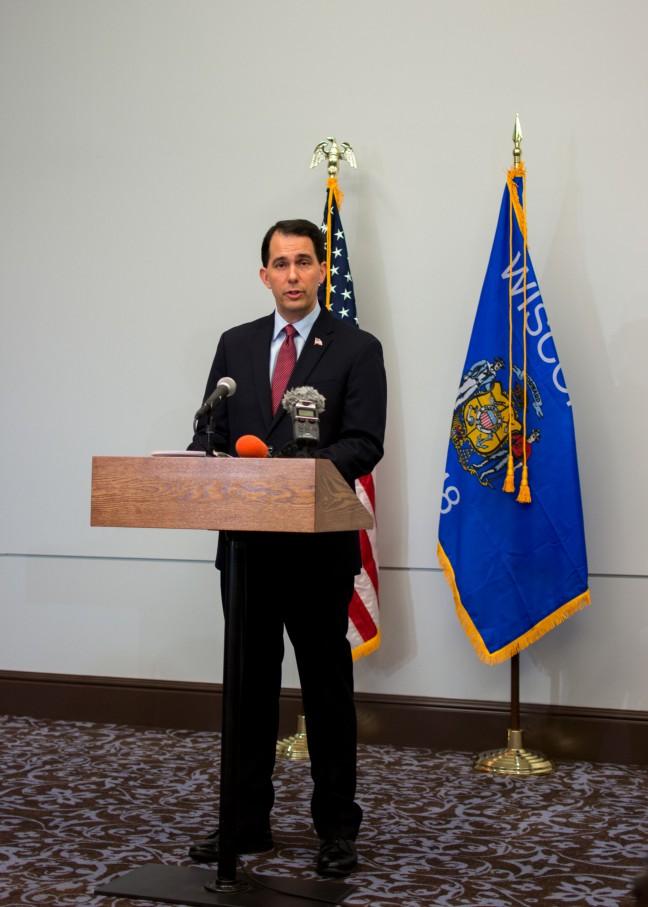[Update 9/22]: Following a rapid decline in the polls, Gov. Scott Walker announced Monday he’ll drop his bid for the 2016 GOP nomination to “clear the path” for a “positive conservative” to rise to the top of the field.
Walker said he was “immediately” suspending his campaign and emphasized it was “fundamentally important” Republicans nominate someone with a plan, rather than someone who simply opposes President Barack Obama’s policies.
“I believe that the voters want to be for something and not against someone,” Walker told reporters at a brief news conference at Madison’s Edgewater Hotel.
Walker’s announcement came a day after a CNN/ORC poll showed him with less than 1 percent nationally among GOP voters. That followed weeks of declining poll numbers and reports his donors were concerned over the direction of his campaign.
Walker, who announced his bid in July, became the second Republican to stop seeking the nomination. His campaign lasted only 71 days.
“It’s really stunning that he is not going to make it to the Iowa caucuses,” University of Wisconsin journalism professor Mike Wagner said. “On paper, he’s somebody that we should’ve expected to be in the top three or four. He probably wasn’t going to get the nomination, but he certainly should’ve been more competitive than he was.”
Walker’s donors expressed concern after a lackluster performance at the first GOP debate, and pundits agreed his second debate performance last week wasn’t much better.
“I suspect that fundraising was a major hurdle for him and that contributions for him really dried up after the first debate,” UW political science professor Barry Burden said.
During the second Republican primary debate last week, Walker spoke for only 8.5 minutes, landing him dead last in the field of 11 candidates on stage. That amounted to 10 minutes less than Donald Trump, who spoke the most and is currently leading GOP primary polls.
Walker’s poll numbers dipped — along with other leading GOP primary candidates — during what some have deemed the “Summer of Trump.”
Trump’s candidacy, Wagner said, pushed Walker out the public eye.
“Once Donald Trump got in, and he was so different from everyone else, it was easy for him to get attention, which I think really made a challenge for Walker and Rick Perry and other people like that,” Wagner said.
Perry, the former Texas governor, was the first to drop out of the GOP race earlier this month and had been one of Trump’s toughest critics, calling him a “cancer on conservatism.”
Walker also implicitly criticized Trump during his announcement Monday, as he called for a number of other GOP candidates to drop out and give a better chance to a “positive” alternative to Trump, though he didn’t mention him by name.
“I encourage other Republican presidential candidates to consider doing the same so that the voters can focus on a limited number of candidates who can offer a positive, conservative alternative to the current front-runner,” Walker said.
Democrats, meanwhile, continued to slam Walker for his policies. Martha Laning, the Democratic Party of Wisconsin chair, said in a statement Walker’s policies as governor “divided our state all in the name of promoting himself for president.”
“Once people saw he had the same plans for the nation that he used in Wisconsin, his support evaporated to zero,” Laning said. “The damage Governor Walker did to our state while running for president is real and will take a long time to repair.”
Assembly Minority Leader Peter Barca, D-Kenosha, also said in a statement Walker’s policies have harmed public schools and infrastructure in Wisconsin.
“Gov. Walker has pushed far right wing policies through Wisconsin hoping that extreme element of his party would propel his presidential campaign to win the nomination,” Barca said.
Labor unions also joined in the criticisms. When Walker jumped into the race in July, the national labor union AFL-CIO released a brief statement saying, “Scott Walker is a national disgrace.” But when Walker exited the race Monday, the union’s president, Richard Trumka, said he’s “still a disgrace, just no longer national.”
In a statement, Democratic National Committee spokesperson TJ Helmstetter maintained that regardless of who’s leading the GOP pack, “voters will ultimately reject the Republican nominee’s jaw-dropping determination to cater to the wealthy at the expense of the middle class.”
Since before he formally announced his campaign, Walker’s verbal stumbles made headlines, including a comment while he was in England that he’d “punt” on a question on whether evolution is real.
Other comments seen as stumbles include a recent comment on NBC that building a wall on the Canadian border was a “legitimate issue,” or saying he wasn’t a “career politician” despite spending much of his adult life in elected office.
Walker also received criticism from some pundits for flip-flopping on topics like immigration.
Why Walker’s flip on immigration matters for his presidential bid
Campaigning on a platform based on tax cuts, reducing the size of the federal government and staunch conservatism on social issues, such as gay marriage and abortion, Walker also faced trouble distinguishing himself among an unusually crowded Republican field.
Wagner said it was hard for Walker to differentiate himself, especially after Trump, an outspoken businessman and entertainer who stands out from the pack of senators and governors, jumped into the race.
More recently, other candidates who are political outsiders — Ben Carson and Carly Fiorina — have improved their standing among GOP voters.
“They [senators and governors] all looked more or less the same with some strengths and some weaknesses here and there,” Wagner said.
Many Walker supporters were hopeful he would be able to unite the GOP’s establishment and grassroots factions, wrote Kyle Kondik from University of Virginia’s Center for Politics. But that proved not to be the case as his poll numbers dipped.
Instead, Kondik wrote, Walker’s more conservative stances on issues like same-sex marriage and immigration made him seem perhaps too radical for many establishment Republicans. In June, a New York Times headline declared Walker’s “hard right turn in Iowa may hurt him elsewhere.”
In turn, non-politicians like Ben Carson, Carly Fiorina and Donald Trump have attracted the party’s grassroots, Tea Party sects, according to Kondik.
“Walker could claim to be an outsider against the likes of a Jeb Bush, but that trio of candidates with zero elected experience made him seem like an insider by comparison, given that he’s spent almost his entire adult life in elective politics at the local and state levels,” Kondik wrote.
Walker, however, still got support from top Wisconsin lawmakers. Sen. Ron Johnson, R-Wis., called him a “man of true integrity and courage,” while Assembly Speaker Robin Vos, R-Rochester, said in a statement Walker’s reforms have “greatly” benefitted the state.
“Governor Walker has an amazing story to tell about turning Wisconsin around,” Vos said. “It is unfortunate that the bluster of candidates overshadowed his substance. I look forward to working with Governor Walker on additional reform measures throughout his second term in office. The nation’s loss is truly Wisconsin’s gain.”
Teymour Tomsyck, Chris Bumbaca, Margaret Duffey and Xiani Zhong contributed reporting to this article.














